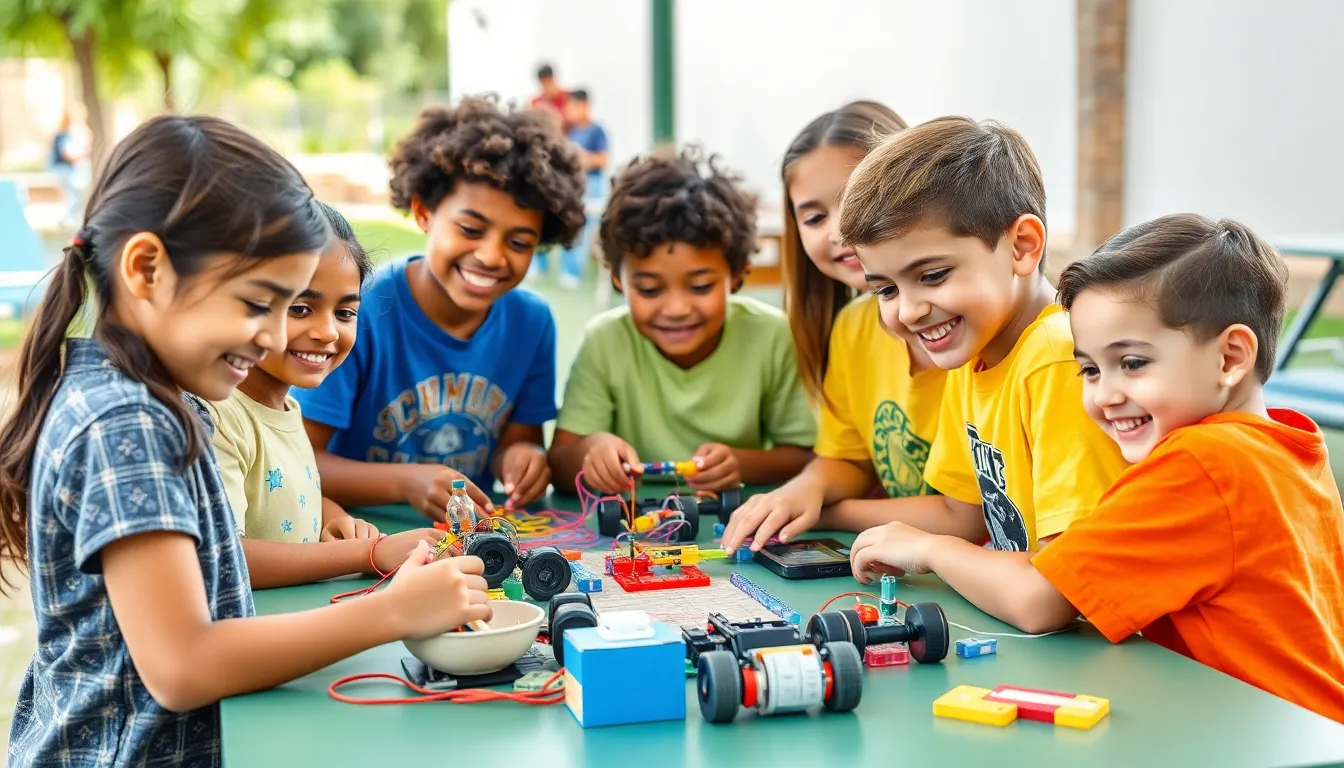Imagine a place where kids trade in screen time for science experiments and math puzzles. Welcome to STEM camp, the magical realm where young minds transform into future innovators. It’s not just about building robots or launching rockets; it’s about igniting curiosity and unleashing creativity.
Table of Contents
ToggleWhat Is STEM Camp for Kids?
STEM camp for kids provides an interactive space where young learners can explore science, technology, engineering, and mathematics. Each participant engages in projects that enhance critical thinking and problem-solving skills. Activities include coding workshops, design challenges, and environmental science experiments, creating a well-rounded experience.
Children develop teamwork and communication abilities during collaborative projects. Camp instructors emphasize hands-on learning, encouraging innovation and creativity. Real-world applications of STEM concepts often inspire kids to think beyond the classroom.
Curricula typically focus on age-appropriate challenges, catering to various skill levels. Programs might also include guest speakers from STEM fields, offering insights into potential career paths. This exposure can ignite interest in future studies and professions.
Parents often notice increased enthusiasm for learning after their child attends STEM camp. Participants report improved confidence in their abilities. Friendships often form through shared experiences, fostering a supportive community.
Many camps also prioritize inclusiveness, ensuring every child feels welcome. Participants learn valuable lessons about empathy and respect while tackling challenges together. The environment fosters growth and exploration, crucial for young minds.
Overall, STEM camps serve as a launching pad for innovative thinkers. By blending education with fun, they create lasting impressions on children. Engaging in STEM activities today sets the foundation for future discovery.
Benefits of STEM Camps

STEM camps offer numerous advantages for young learners, promoting both intellectual growth and social development.
Enhancing Critical Thinking
Critical thinking skills thrive in a STEM camp environment. Children analyze problems, develop solutions, and evaluate results through hands-on activities. For example, coding workshops challenge kids to troubleshoot errors and enhance logical reasoning. Design challenges encourage them to question assumptions and explore alternative methods. Instructors guide learners as they engage in experiments, fostering independent thought. Sharing ideas during group projects builds confidence and encourages different perspectives. Research shows that kids exposed to STEM education demonstrate improved analytical skills, benefitting their academic performance in other subjects.
Fostering Creativity
Creativity flourishes in the dynamic setting of a STEM camp. Participants engage in imaginative tasks like building original prototypes or coding unique games. They make choices about design elements, promoting innovative thinking. Diverse projects inspire children to explore their interests, transforming concepts into tangible outcomes. Collaboration leads to brainstorming sessions where ideas evolve through discussion, further enhancing creative skills. Exposure to various materials and technologies allows experimentation and risk-taking. Studies indicate that children who participate in creative STEM activities exhibit greater inventiveness and adaptability, skills essential for future success.
Types of STEM Camps
STEM camps come in various formats, each focusing on different aspects of science, technology, engineering, and mathematics. Each type offers unique experiences tailored to different interests.
Robotics Camps
Robotics camps immerse children in the world of automation and engineering. These programs often include building and programming robots, which allows participants to gain practical skills in mechanics and coding. Engaging with real-world challenges, young learners collaborate on designing robots that can perform specific tasks. Instruction typically covers fundamental concepts such as sensors, motors, and programming languages. By the end, campers showcase their creations, enhancing their understanding of robotics and teamwork.
Coding Camps
Coding camps teach children the basics of programming in an exciting environment. Through hands-on projects, participants learn to write codes using various languages like Python or Scratch. Instruction focuses on creating games, apps, or websites, emphasizing creativity and problem-solving. Children often collaborate on projects, which fosters communication and teamwork skills. By the end of these camps, kids not only understand coding principles but also develop critical thinking skills that apply to many areas of study.
Science Camps
Science camps provide an engaging platform for students to explore various scientific disciplines. These camps typically cover topics like biology, chemistry, and physics through experiments and fieldwork. Children participate in hands-on activities, such as conducting experiments or performing ecological studies. Exposure to real-world science cultivates curiosity and analytical skills. By collaborating with peers and instructors, participants enhance their understanding of scientific concepts while developing teamwork and observational skills.
Choosing the Right STEM Camp
Selecting a suitable STEM camp involves understanding different elements that ensure a great fit for children. Several factors, such as age appropriateness and curriculum focus, determine how well a camp will cater to your child’s needs.
Age Appropriateness
Age groups define the camp’s approach, ensuring activities match children’s developmental stages. Camps may cater to specific age ranges, such as 5-8 years or 9-12 years. Younger campers benefit from guided exploration, while older groups focus on advanced projects and discussions. Assessing the camp’s intended audience helps gauge potential engagement. Programs that suit age-specific interests foster motivation and enhance learning experiences. Insight into the camp structure and age requirements leads to informed choices that promote enjoyment and participation.
Curriculum Focus
The curriculum should align with your child’s interests and education goals. Some camps prioritize robotics, allowing for hands-on experiences in building and programming. Others may focus on coding, where children learn programming languages through projects. Science camps explore subjects like biology or chemistry, encouraging inquiry through experiments. Identifying specific learning outcomes, such as teamwork or problem-solving, adds value. Analyzing the curriculum emphasis aids in selecting a camp that enhances knowledge while keeping children engaged. Even interdisciplinary camps incorporate elements from various fields, providing a comprehensive experience that sparks curiosity and innovation.
STEM camps offer children a unique opportunity to dive into the world of science technology engineering and mathematics in a fun and engaging way. By fostering curiosity and creativity these camps help young minds develop essential skills that will serve them well in the future.
Through hands-on projects and collaborative activities kids not only learn technical skills but also build confidence and teamwork abilities. The supportive environment encourages friendships and nurtures a sense of belonging.
As parents consider options for their children’s summer activities STEM camps stand out as a valuable investment in their educational journey. With the right camp children can unlock their potential and ignite a passion for learning that lasts a lifetime.









